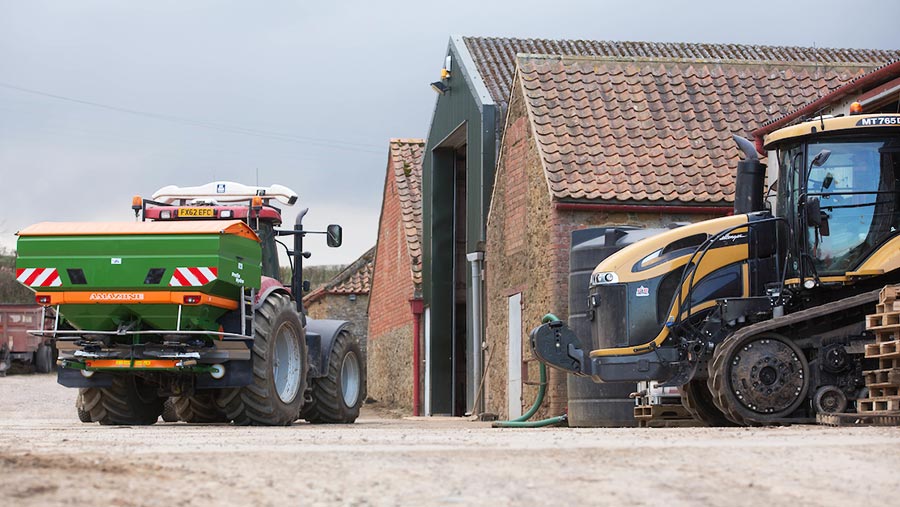Coronavirus: Guidance for farmers and contractors
 English Farmyard
Picture Tim Scrivener 07850 303986
English Farmyard
Picture Tim Scrivener 07850 303986 An improvement in weather conditions means farms are now buzzing with activity, but it’s imperative that employers and staff given ‘key worker’ status take all the precautions outlined by the government.
The National Association of Agricultural Contractors (NAAC) has released a guidance document that offers advice on how to manage the workload while minimising the spread of the disease.
Direct contact should be avoided wherever possible and extra precautions should be taken in areas frequented by several people, such as the diesel tank.
See also: All of our coronavirus advice and news
Cab hygiene
Tractor cab hygiene must be made a priority so, where possible, employers should enforce a one person, one machine policy.
If this is not practical, cabs must be cleaned by a member of staff wearing personal protective equipment.
Be sure to wipe down all door handles and controls and ask staff to touch surfaces/open doors with their non-dominant hand, with which they will be less likely to touch their face.
Try to avoid relying on gloves unless they are frequently changed – it’s better to prioritise frequent hand washing.
It may also be worth putting a note in the cab window, reminding people not to touch the door handle and providing a phone number with which to contact the driver.
Businesses should also consider the likelihood of staff taking time off to self-isolate. With that in mind, it might be prudent to make sure several members of the team are capable of operating high-tech equipment.
However, bear in mind the challenges of training while keeping a safe distance from team members.
See also: NAAC farm contractor charges 2019-20
Assess the risk, says the NAAC
Ensure you and your staff are fully informed and taking all necessary precautions to minimise the risk of catching or spreading the virus. It’s worth considering the following:
- Encourage employees to work at home, wherever possible. Office staff should be equipped to work remotely. All access to offices and workshops should be strictly limited to essential staff only and provision must be made for keeping surfaces clean and ensuring staff have access to hand washing/hand sanitation facilities.
- Discourage visitors to your yard – put up notices if necessary. Ensure delivery drivers remain at least 2m away and ask for parts to be left at a distance in a secure place. Ideally, don’t sign for them – most only require a name.
- Close staff tearoom/facilities to avoid all close contact, only allowing access to washrooms/toilets.
- If someone becomes unwell in the workplace with a new, continuous cough or a high temperature, they should be sent home immediately.
- Employees should be reminded to wash their hands for 20 seconds more frequently and catch coughs and sneezes in tissues (which should be disposed of).
- Frequently clean and disinfect objects and surfaces that are touched regularly, using standard cleaning products.
- Make sure all staff have been issued with the latest guidance from government.
- Employees will need your support to adhere to the recommendation to stay at home to reduce the spread of the virus.
- Those who follow advice to stay at home, and who cannot work as a result, will be eligible for statutory sick pay (SSP) from the first day of their absence from work.
- Employers should use their discretion and respect the medical need to self-isolate in making decisions about sick pay. Use discretion regarding the need for medical evidence for employees who are unwell. This will allow GPs to focus on their patients.
- Employees from defined vulnerable groups should be strongly advised and supported to stay at home.
- Ask customers to avoid any contact with you and your staff wherever possible – ideally have work established remotely, prior to the job. All safety risks, locations, mapping and job requirements should be fully explained by the customer prior to your arrival.
- Do not share customers’ machinery off-site.
- Ask customers to make you aware of any of their family or staff who have contracted the virus or who are self-isolating. This will ensure that all parties respect social distance and do not unwittingly put anyone at unnecessary risk.
- Bear in mind that there may be children on the farm, which pose an added health and safety risk.
You can also download and print the NAAC’s checklist for contractors visiting farms (PDF) to make sure you’re following all the necessary procedures.

